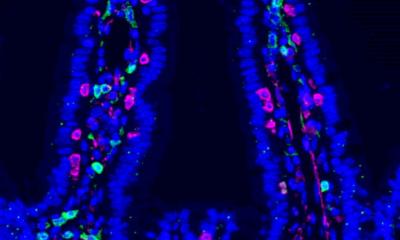Oral vaccination against pancreatic tumours
The world’s first gene cancer therapy study of an innovative oral vaccine is underway at the Surgical Clinic of Heidelberg University Hospital.

For pancreatic cancer patients hope has a name: VXM01. The vaccine contains a bacterium that carries genetic information of the stromal cells and aims to slow down tumour growth and metastases spread. The scientists use a known strategy: They stimulate the body’s immune system by linking the immune defence against the bacterium with the immune defence against the genetic information of the introduced protein.
The project began in December 2012. ‘Today, just a few months into the study, the initial results are encouraging,’ said Dr Hubertus Schmitz-Winnenthal, principal investigator and head of the section of Endocrine Surgery at University Hospital Heidelberg. ‘We are hopeful that the immune defence will react to the vaccine in specific way’,
Results in ten days
Developed by Dr Schmitz-Winnenthal with the Swiss-German biotechnology company VAXIMM, the vaccine is being tested in a placebo-controlled dose escalation trial (phase I/II ) in up to 45 pancreatic cancer patients. ‘Obviously we are closely monitoring the clinical efficacy of the vaccine, nevertheless the study’s main objective is the exclusion of adverse effects’, the principal investigator explained. In addition to chemotherapy, either the vaccine or a placebo are administered during a 10-day stay of patients who cannot undergo surgery or where the pancreatic cancer has metastasised. During the trial the dose is slowly increased from patient to patient to determine the most effective dose. At the end of the hospital stay the investigators can evaluate the effects of the vaccine on the immune defence via an immune examination. Biomarkers, MRI and oncological follow-up visualise the therapy results.
Bacterium as a Trojan horse
The bacterium contained in the vaccine acts as a Trojan horse. The modified attenuated carrier bacterium is an approved and welltolerated vaccine. It transports a gene into the intestinal mucosal cells, which produces a specific protein called VEGFR-2 that is also present in the tumour blood vessels. The intestinal mucosa identifies the protein combined with the bacterium as hostile and thus prompts the immune system to fight cells with VEGFR-2. The T-cells have a three-pronged strategy: they attack the vessels that supply the tumour with blood and nutrients and are thus a major support system for tumour growth, they attempt to isolate the tumour so that it cannot disseminate, and they attack the tumour cells directly.
Dr Schmitz-Winnenthal: ‘Animal studies have shown the vaccine to be effective against several types of tumours. Tumour growth slowed down and metastasisation was reduced. The animals that had been vaccinated had significantly higher chances of survival.’ The first study results on the safety and potential efficacy of the vaccine in human patients are expected in early 2013. Further clinical studies (phase II ) will also include patients of other tumour types. If the successes in animals can be repeated in patients, the first oral vaccine to trigger immune responses in the intestines will most likely play an important role in the future treatment regimens of cancer patients.
02.05.2012





